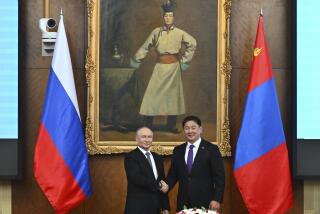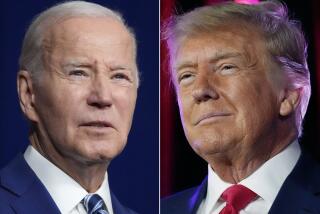Briefing Paper : For the First Time, Mongolians Have Political Choices
- Share via
The News:
Communist-ruled Mongolia will hold multi-party parliamentary elections Sunday, a first in the country’s history. The Mongolian People’s Revolutionary Party (MPRP), as the Communists are officially known, will face off against an opposition coalition. The elections culminate eight months of dramatic political liberalization in the landlocked nation of 2 million people. . . . Political change is paired with growing openness to the world. Secretary of State James A. Baker III is due to visit Ulan Bator on Aug. 2-5 for talks on bilateral relations, including a plan to dispatch U.S. Peace Corps volunteers to Mongolia.
The System:
Voters will elect representatives to five-year terms in Mongolia’s supreme legislative body, the 430-member People’s Great Hural. Members of provincial and local governmental bodies will also be chosen. Preliminary elections were held last Sunday to narrow the number of candidates to two in each district. The Great Hural, which convenes once a year, elects the president of Mongolia. It also will establish a routinely functioning legislature, the 53-member Small Hural, based partly on a party preference vote that will be included in Sunday’s ballot.
At Stake:
The elections mark a key step in the transformation of Mongolia’s political and economic life toward a system closer to Western-style democratic capitalism. Even the opposition seems to view the elections primarily as a part of this process, rather than as a chance to take control of the government.
The elections “will become a basis for (the) soonest switching over to a full market economy, parliamentary democracy and promotion of pluralism of views,” predicted Sanjaasuren Zorig, head of the Mongolian Democratic Assn., the first and most prominent opposition group in the country.
The elections also should help Mongolia’s moves to loosen its extremely close 69-year-old ties with the Soviet Union and to develop closer relations with rich industrialized democracies. President Punsalmaagiyn Ochirbat, in a May speech to the Great Hural, said reform of Mongolia’s political structure is important not only for the country’s “socioeconomic and cultural renewal” but also for its “foreign policy construction.”
Background:
Change in Mongolia reflects the rapid liberalization that has swept the old Soviet bloc. Rapid democratization began here in December, when dissidents twice held demonstrations in Ulan Bator. Protests escalated in January and February. The ruling party responded with a conciliatory stance, pledging a gradual transition toward a multi-party democracy.
Opposition parties complained in June that proposed election procedures were unfair and threatened a boycott. But after winning concessions, they said they would participate.
Ochirbat, in a July interview with the MPRP-controlled newspaper Unen, said that “all existing political parties lack experience, which leads to some errors and mistakes during the election campaign.” He called for “flexibility and mutual dialogue in the settlement of any problems or disagreements concerning the elections.”
Parties:
The Mongolian People’s Revolutionary Party established the world’s second Communist state after coming to power in 1921 with Soviet backing. It dropped the word “communism” from its party constitution in April, setting the new goal of building “democratic humane socialism.” It now favors market-oriented economic reforms. In a concession to the opposition, the MPRP says it is suspending the political activity of its branches in army, militia and state security organs from mid-July until after formation of the new Great Hural and Small Hural.
The Mongolian Democratic Party, the country’s first opposition party, was created in February, even before such action was legal. Its parent organization is the Mongolian Democratic Assn. The MDP has called for the ruling party and opposition to work together to “speed up economic, political and social development . . . and take better care of the poor, the handicapped and those victimized in years of repression.”
The National Progress Party was established primarily by a group of young economists. “Our party’s major goal is to support progressive national traditions in close combination with every progressive idea appearing in the world,” Dagvasurengiyn Ganbold, chairman of the party, said in a June interview with Radio Ulan Bator. “The Mongols since ancient times have respected and advocated free ideology, and there was no tradition of repressing people of different ideology.” The party wishes to restore this spirit of tolerance, he said.
Other parties contesting the elections include the Social Democratic Party, the Party of Free Labor and the environmentalist Green Party. All but the Party of Free Labor are cooperating in an opposition coalition.
Personalities:
The mastermind of the opposition movement has been Mongolian Democratic Assn. leader Zorig, whose background paradoxically is as a scholar of Marxism. A colorless speaker, Zorig, 27, who is half Russian, makes up in organizational talent what he lacks in charisma.
President Ochirbat formerly headed the ministries of fuel and power, and of geology. The MPRP is headed by Gombojavyn Ochirbat (no relation to the president), a former trade union president and head of party ideology who faced official criticism in the early 1980s. He was elected party chief in March, only days after returning to Ulan Bator from two years spent in Prague.
Outlook:
The Mongolian Democratic Party claims that polls show its support in some major cities at about 40% to 50%. But the MPRP says it has majority support among urbanites. The ruling party is presumed to have a strong edge in the countryside, where livestock herders are unfamiliar with democratic procedures and have only limited knowledge about the opposition.
MPRP officials, in a concession made early this month, promised that even if their party dominates the election, the opposition will be given some positions in the new Council of Ministers.
“It is quite understandable that newly set up political parties cannot compete with the MPRP that has been ruling the country for 70 years now, in terms of membership, finance and reputation,” National Progress Party Chairman Ganbold said in a June interview with Radio Ulan Bator. “This year’s elections must become a step forward in the development of democracy in the genuine sense. Herein lies the main significance of the participation of the democratic forces.”
A Land in Transition
Mongolia Population: 2 million Area: 604,247 square miles Capital: Ulan Bator Political Status: Independent since 1921; Communist People’s Republic established 1924. Leader: President Punsalmaagiyn Ochirbat Economy: Animal husbandry, largely collectivized, supplies most of the economic output and exports. Copper-molubdenum ore plant in Erenet is one of the world’s largest.
More to Read
Sign up for Essential California
The most important California stories and recommendations in your inbox every morning.
You may occasionally receive promotional content from the Los Angeles Times.













